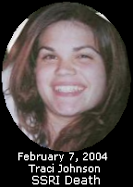What first came into my mind was the title that reminded me of "Darkness Visible" I've read years ago by William Styron about the period he has suffered a serious depression.
He is the author of "Sophie's Choice" and in "Darkness Visible" he makes a great description about his recovery from depression. It was on 1985, before Prozac, that his disease started and he explains how terrible was his experience with Halcion a drug that his doctor said he could take "like aspirin". He was prescribed a high dose of this benzodiazepine plus Valium and Ativan.
Halcion has affected him deeply and made him experience suicidal ideations and played a great role worsening his depressed feelings one of the reasons he went to hospital. He gives many advices about the power of Halcion.
I can imagine how this drug has affected him because I have taken it and reported to the doctor that I was having strange side effects, hallucinations included.
He was so depressed that ECT was considered as a treatment but fortunately he started recovering.
It's a great book and is written with wit and an astonishing comprehension on the depression condition and it's treatments. I hope he's in peace. He died in 2006.
I digress. The article by Daphne Merkin explains some of the feelings depressed people have, the inability to cope with daily tasks, the life in an mental institute with great accuracy.
Than the psych-drugs arrive at the scene:
"My current regime of pills incorporated the latest approach, which called for the augmentation of a classic antidepressant (Effexor) with a small dose of a second-generation antipsychotic (Risperdal). From the time I was prescribed Prozac in my early 20s before it was approved by the Food and Drug Administration, you could say that the history of depression medication and my personal history came of age together, with me in the starring role of a lab rat.She says it at the beggining of the article and at the end:Of course, none of the drugs work conclusively, and for now we are stuck with what comes down to a refined form of guesswork — 30-odd pills that operate in not completely understood ways on neural pathways, on serotonin, norepinephrine, dopamine and what have you. No one, not even the psychopharmacologists who dispense them after considering the odds, totally comprehends why they work when they work or why they don’t when they don’t. All the while the repercussions and the possible side effects (which include mild trembling on the one end to tardive dyskinesia, a rare condition that causes uncontrollable grimacing, on the other end) are shunted to the side until such time as they can no longer be ignored."
And then, the Sunday afternoon before I planned to return to 4 Center, something shifted ever so slightly in my mind. I had gone off the Remeron and started a new drug, Abilify. I was feeling a bit calmer, and my bedroom didn’t seem like such an alien place anymore. Maybe it was the fear of ECT, or perhaps the tweaked medication had kicked in, or maybe the depression had finally taken its course and was beginning to lift. I had — and still have — no real idea what did it. For a brief interval, no one was home, and I decided to get up and go outside. I stopped at Food Emporium and studied the cereal section, as amazed at the array as if I had just emerged from the gulag. I bought some paper towels and strawberries, and then I walked home and got back into bed. It wasn’t a trip to the Yucatan, but it was a start. I didn’t check into the hospital the next day and instead passed the rest of the summer slowly reinhabiting my life, coaxing myself along. I spent time with people I trusted, with whom I didn’t have to pretend.After this shift the next two paragraphs that ends the article plains for a wonderful life are done. The End.
William Styron says that he believes that "time and isolation" made him recover. Now it seems that all roads leads to a psych-drug. What amazes me most is that this article is being published at a time antipsychotics are being considered as the first possible drug to treat depression and Philip Dawdy has been writing numerous articles about this trend. This is one of them:
10% of Depressed Patients Now Take Antipsychotics:
"This trend also signifies just how weak a technology anti-depressants have proven to be in many cases (even the Abilify TV ad for depression states that two-thirds of people who take an anti-depressant don't see good results), how desperate some people are for relief and how willing they are to try out psychiatry's nuclear weapons. That says something about depression and America."
















No comments:
Post a Comment